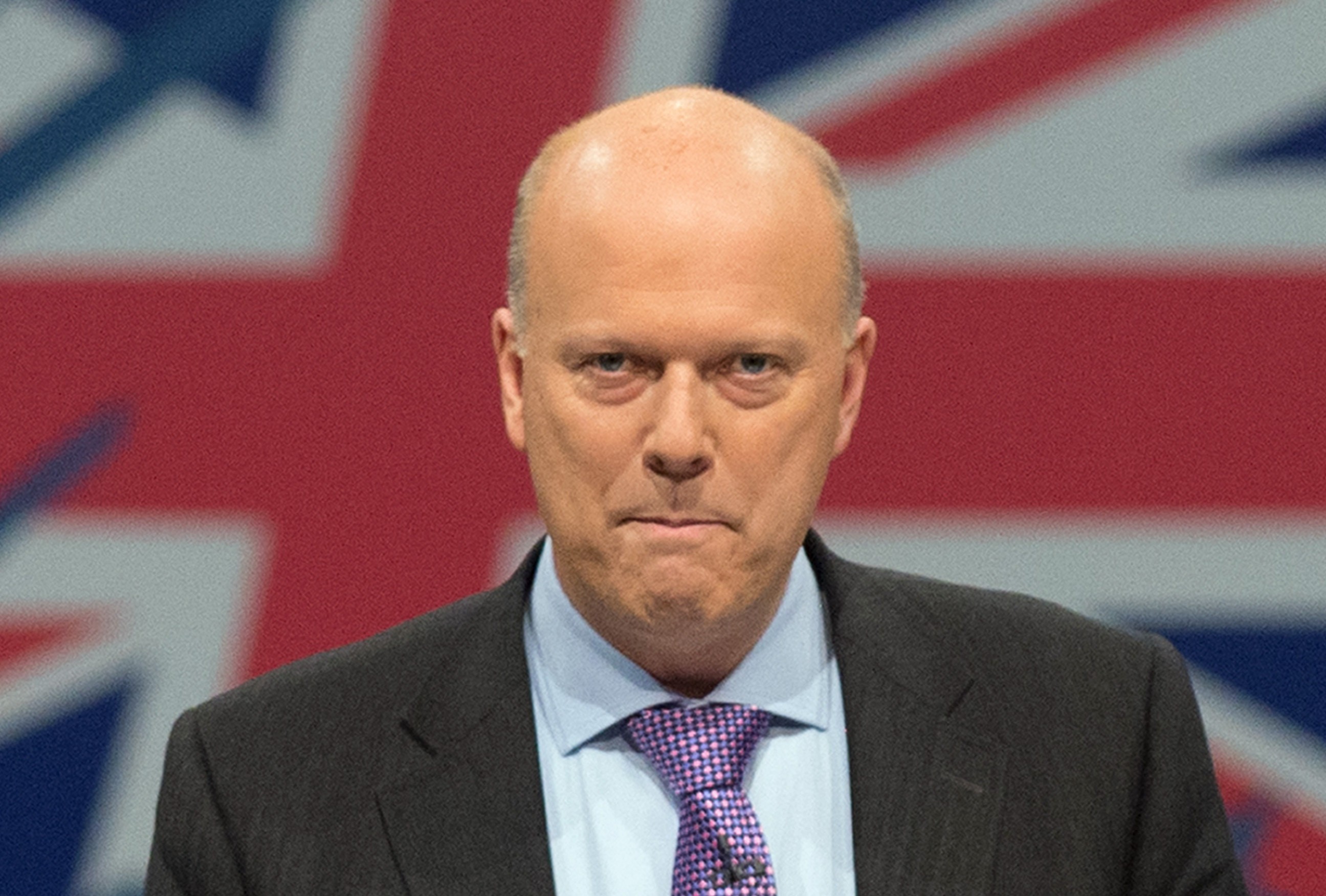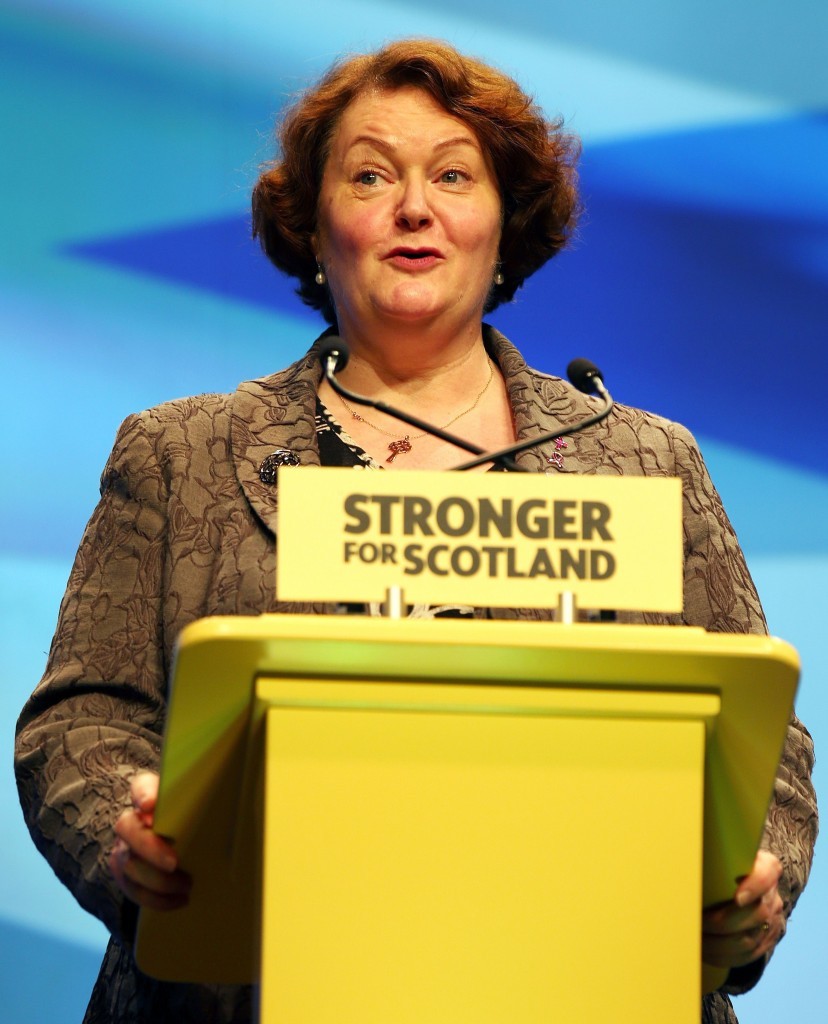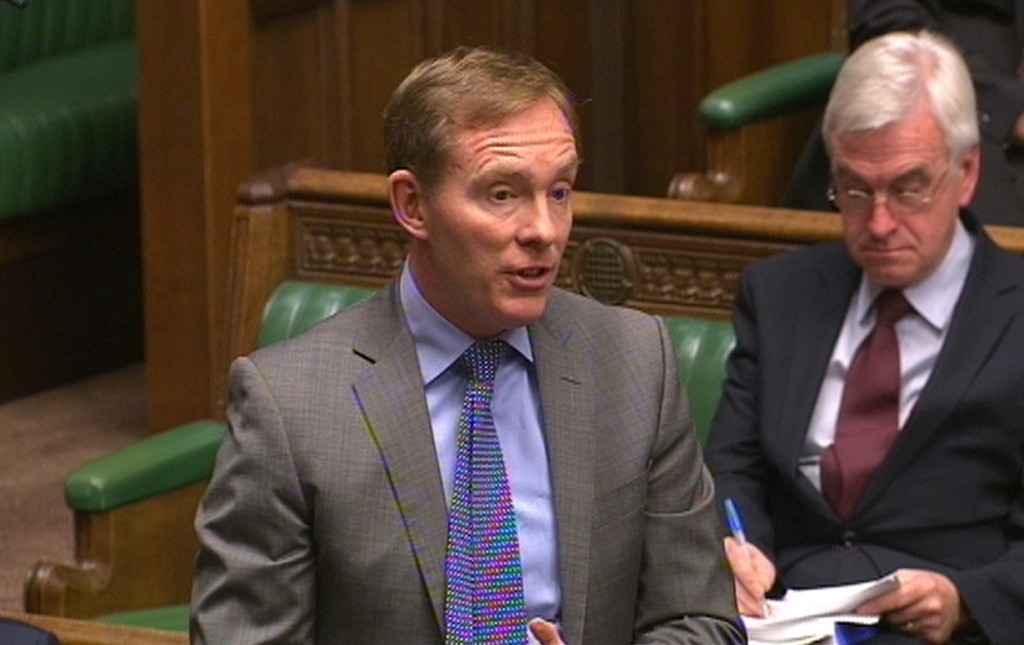
In an immediately bad tempered debate, the Commons leader outlined revisions to his plans to hand extra powers to English, or English and Welsh, MPs when legislation in the Commons only affects their constituents.
If they are agreed by MPs in the lobbies the changes to standing orders will be in place for a one year trial and Mr Grayling said he expected the new rules to be used in relation to three or four Bills in that time.
The proposals create new stages in the legislative process where the Speaker declares a Bill, or clause within a Bill, is English or English and Welsh only. All MPs will continue to speak and vote on the existing legislative stages but only relevant MPs will be allowed to vote at the new phases.
Mr Grayling abandoned an attempt to force through a draft in July amid protests from his own side but after accepting amendments from the Procedure Committee appears to have eased Conservative concerns.
He told MPs: “These proposed changes enable us to give an answer to the West Lothian question, they enable us to give an answer to our constituents, to say England will have its own piece of our devolution settlement.
“They do so without removing any member of Parliament from the workings of this chamber. We are going to hear much this afternoon about how this will create different classes of MPs, how it will exclude MPs, how it is shutting MPs out from the job they do.
“The truth is actually it is nonsense. Despite all the rhetoric our proposals do none of that. What they do is bring fairness to our devolution settlement and it is fairness that will secure the future of our union.”
Among the changes accepted by Mr Grayling are rules allowing the Speaker to explain his reason for certifying an issue as English or English and Welsh only. The Speaker will also be able to call on two senior MPs to help make the ruling.
Estimates resolutions – which set public spending – are outside the new rules, which Mr Grayling said should avoid problems with so-called Barnett consequentials – the formula which sets overall grants to the Scottish Parliament, Welsh Assembly and Stormont.
The proposals are set to be bitterly opposed by Labour and the SNP who insist the plans will cut non-English MPs out of crucial legislative processes.
Votes are due to begin at 4pm on a series of amendments to the 19 pages of standing order revisions tabled by Mr Grayling.
Labour’s David Hanson (Delyn) questioned why all peers, including those who had fought and lost Welsh and Scottish Commons seats, would continue to be allowed to vote on all legislation at all stages.
He said: “Why is it Lord Thomas of Gresford, who has fought four elections in North East Wales, never won an election, but sits in the Lords, will have rights over my constituents in moving motions on an amendment when I, who have won six elections to this place, will not have the same rights.”
Mr Grayling said: “The answer to that question is in 1997 in the wake of the general election, Labour passed a devolution package that meant on issues like health and eduction you had no right to vote on the issues that effected your constituents but of course the people on the Assembly did.”
For the SNP, Philippa Whitford (Central Ayrshire) said she was “upset and hurt” to be criticised for speaking in the private members’ bill debate on assisted dying because the legislation would not have covered Scotland.
She said: “I would have to say anyone who thinks introduction of assisted dying here would have no impact shows the difficulty of picking which bills we should be excluding.”
Mr Grayling said: “This is precisely why I am not proposing you should be excluded from any debate you currently take part in. I am saying today as leader of this House I do not want you to be excluded from any debate or any vote you currently take part in.
“Nothing in these proposals will make that happen.”
Conservative Sir Edward Leigh, a member of the procedure committee, praised the changes made since July. He said: “I am grateful for the way you listened to our representations.
“You know I raised on many occasions the problem of Barnett consequentials, it could be argued in Scotland they don’t have the same voting rights and it affects their spending because of the Barnett formula in Scotland.
“Will you undertake to review this matter and report back to the House?”
Mr Grayling said: “I have looked very carefully at this issue. I have not identified mechanisms outside the estimates process that would create a Barnett consequential.
“But I have asked officials to continue to monitor this over the period leading up to the review.
“If we identify a problem in this area I will return to it as part of the review.”
Shadow leader Chris Bryant has tabled a series of amendments to the new standing orders which Mr Grayling dubbed “wrecking amendments.”
Mr Bryant said the proposals were so complicated that they resembled a “bowl of soggy, overcooked spaghetti” and claimed they would hasten the break up of the United Kingdom.
The Labour frontbencher said: “I think Conservative and Unionist MPs in the end will rue the day if they vote for these measures because this is a charter for breaking up the union, not for keeping it together.”
Mr Bryant said the addition of up to six new processes to already complicated Commons procedure would not be understood by most MPs and the wider public, and claimed that even Mr Grayling does not fully comprehend the plans.
Labour is instead calling for a constitutional convention to draw up plans to address the West Lothian question and other matters of devolution
Mr Bryant said: “My problems with the measures before us are many.
“Firstly I believe they are far, far too complex, that’s why Mr Grayling didn’t bother to explain them this afternoon.
“They introduce at least six new processes for each Bill.
“They will be incomprehensible to most members of this House let alone the wider public.
“In years to come people will be running competitions to see if anyone can possibly explain these measures in fewer than 1,000 words and I bet you nobody will ever win that prize.
“Some have described all of this as constitutional knitting but knitting at least has a rhyme and a reason to it.
“This frankly will be a bowl of soggy, overcooked spaghetti.”
He added: “The reason I was upset that Mr Grayling didn’t lay out his plans because in the previous debate we had earlier this year which I didn’t take part in but I read, I noticed that he made several mistakes about his own proposals and I don’t honestly think he fully understands them.”
Plans to create a veto stage for English MPs, or English and Welsh MPs, would create two tiers of MP and break with an 800 year old tradition and convention that they are all equal, Mr Bryant said.
“I personally have no objection whatsoever to an England-only committee to do the line-by-line consideration of legislation that is only England,” he said.
“But like the McKay commission I think there is a real danger when you then give a veto to English MPs only because you create two tiers of MP.”
Mr Bryant also claimed that requiring the Speaker to certify which Bills are English, or English and Welsh, only would “politicise” the role and make him a servant of Government rather than the Commons.
He claimed MPs are “bound to try and tie the Speaker up in knots”, before adding: “Also since certification has to happen before second reading, the Speaker will in effect be able to delay when second reading can take place.
“Mr Grayling tells me that the Government will provide clear instructions to the Speaker on how he should certificate but that is surely to turn the Speaker into the creature of the Crown, not the servant of this House.”
Procedure Committee chairman Charles Walker described the plans as the “least worst option”.
He said: “We are where we are.
“The former prime minister, Tony Blair that is, said he did not give enough consideration to the impact of devolution on England in 1998.
“What we are debating today is the least worst option on the table in my view.
“Would we start from this point in a perfect world? No we wouldn’t.”
Gerald Kaufman says #evel debate is "ghastly" & one of nastiest he's seen in 45 years in parliament
— James Millar (@PoliticalYeti) October 22, 2015
The Father of the House, Sir Gerald Kaufman, described the Evel debate as”ghastly”.
“This is one of the nastiest, most unpleasant debates that I have attended in 45 years,” he said.
The MP for Manchester Gorton accused the Government of deciding to “alter what this House of Commons is about” for “momentary political convenience because it has a small majority”.
“This Government… has no respect for the House of Commons,” he said.
“It doesn’t care about the principles upon which the House of Commons are based – it simply wants convenience relating to certain legislation.”
Sir Gerald described the Evel debate as a “day of shame” for the Commons.
Pete Wishart on his feet. Says #evel plans are 'stupid'
— James Millar (@PoliticalYeti) October 22, 2015
Pete Wishart, SNP MP for Perth and North Perthshire, described the Government’s plans as “stupid” and insisted they would make Scottish MPs “second classcitizens”.
He said: “Scotland is watching this and the mood is darkening.
“If this is an exercise in saving the Union you could not have contrived of a more inept way to save the Union.
“Support for independence is actually increasing.”
Mr Wishart also said Evel would “politicise” the role of the Speaker and that could lead to legal challenges over which Bills get designated as English-only matters.

Enjoy the convenience of having The Sunday Post delivered as a digital ePaper straight to your smartphone, tablet or computer.
Subscribe for only £5.49 a month and enjoy all the benefits of the printed paper as a digital replica.
Subscribe
